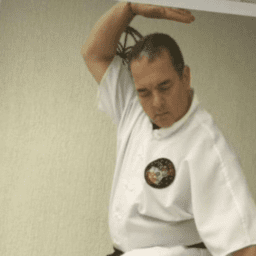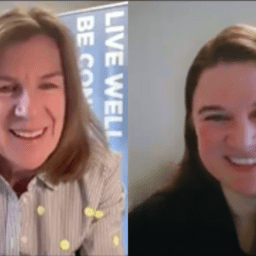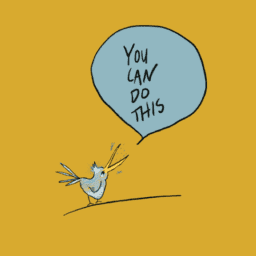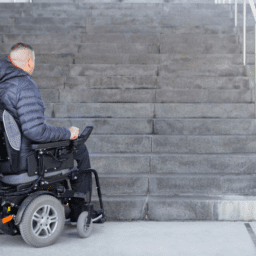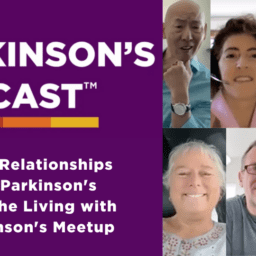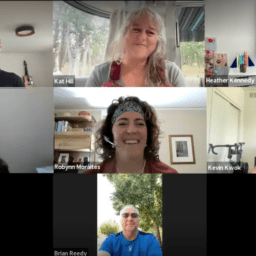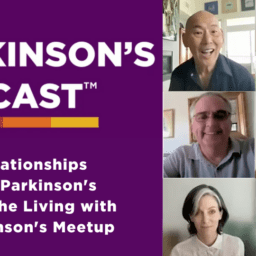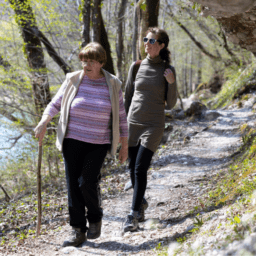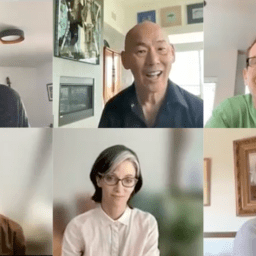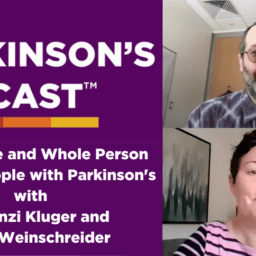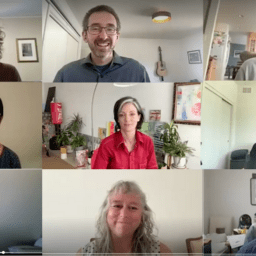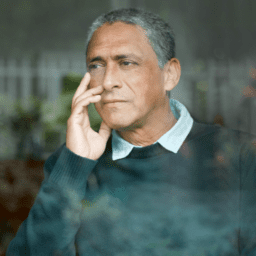In this video, Dr. Benzi Kluger, movement disorder specialist, and Kelly Weinschreider, a person living with Parkinson’s, discuss the value of palliative care (aka supportive care or whole person care) from the very beginning of a Parkinson’s journey. We discuss what palliative care is and isn’t, the palliative care approach, how to advocate for care, where to look for care, and more.
You can read the transcript below or you can download it here.
Note: This is not a flawless, word-for-word transcript, but it’s close.
Melani Dizon (Director of Content and Education, Davis Phinney Foundation):
Hello and welcome everybody. My name is Melani Dizon. I’m the Director of Education and Content at the Davis Phinney Foundation, and I am here today with Dr. Benzi Kluger and Kelly Weinschreider. How are you guys doing today?
Kelly Weinschreider (YOPD, Parkinson’s Palliative Care Advocate):
Good, thanks. How are you?
Melani Dizon:
Good. It’s great to be here. We are going to be talking about all things palliative care. To get us started though, Dr. Benzi Kluger, I would love for you to tell us who you are, and how you got involved in this work. You’ve been a big part of the foundation for a very long time, so it’s lovely to talk to you again.
Benzi Kluger, MD, MS, FAAN (Professor of Neurology and Medicine, Director of Palliative Care Research Center, University of Rochester Medical Center):
Yeah, thanks. Yeah. I got interested in palliative care not by purpose, I guess. There are a lot of great things in my life that happened. Not on purpose but I did fellowships in behavioral neurology, which is the part of neurology that deals with memory issues. And then I did another fellowship in movement disorders, which includes Parkinson’s disease. And when I finished my fellowships, I thought I was going to be doing research on fatigue and neurophysiology and stuff like that. But when I got into practice and I began seeing patients not as a trainee, which meant that I was developing relationships and seeing people long-term the diagnosis was not that interesting. Like the thrill of making a diagnosis was gone and the reality of what a diagnosis meant was really reinforced because I was seeing people over time and getting to know them.
And I was just bothered by the fact that our models of care to me and I think to my patients and families just left so many important things unaddressed. And I was feeling, you know, a bit helpless and hopeless as a physician. And I was fortunate to work at an institution that has a great palliative care program. And I was talking to Gene Cutner, who’s a leader in palliative care about the things I was seeing and just how helpless I was feeling. And she said, you know, you really should think about whether, you know, whether or how palliative care might, might be something that would be helpful for people with Parkinson’s and other neurologic disorders. And that was, it’s about 15 years ago. And, you know, I’ve just been, I mean, that’s kind of become, become my life. So, it was great advice. And I think palliative care really, which we’ll talk about a lot, I think fills a lot of gaps that a lot of people with Parkinson’s have experienced.
Melani Dizon:
Sorry, that was not I was on mute, Kelly. Great. What about you? How did you get involved in this?
Kelly Weinschreider:
I’m a Parkinson’s page person with Parkinson’s. Hold on. Let me start that over. Yeah. I’m a person with Parkinson’s. I’ve lived with Parkinson’s since 2002. I was diagnosed at age 29. So, I’ve had a long journey with Parkinson’s. And my father also had Parkinson’s. So really my involvement or my investment in palliative care has been through working with Benzi’s group. And really you know, I saw what my dad went through kind of in his end stages. And I thought there has to be something better than this. There has to be a better quality of life than what he went through. And I, you know, I myself will go through it at some point, and I hope that palliative care can provide as beneficial for him. He did have a small amount, but what it did do was fantastic for him. So, I, you know, I’d like to see it expand more and have more people are aware of palliative care and the benefits, and I think Benzi, Dr. Kluger is doing a great job of getting people involved.
Melani Dizon:
Yeah. Okay. Great. Well, I think we’re going to dig into that for sure. But Benzi, can you tell us, when we say palliative care, what are we talking about and what are some of the other words people use instead of palliative care?
Benzi Kluger:
Yeah. The word, the word palliative care has become a bit charged. And we can talk about why that is. The alternative term that’s often used is supportive care. But there, they’re really equivalent. And what palliative care is, in a nutshell, is it’s an approach to the care of people living with a serious illness that involves both patients and families. And the goal is simply to do what we can to improve quality of life.
Melani Dizon:
Great.
Benzi Kluger:
And that seems pretty straightforward, but it does differ from a lot of medical care. Most medical care is in what’s called a biomedical model. And so, the goal of most medical care is that we want to treat a disease. We may want to target specific symptoms, but it’s all about biology and physiology. Palliative care is all about people. Yeah. And so, we recognize that symptoms like pain and other things like that are important and can limit people’s quality of life. But we further recognize that social isolation feeling helpless and hopeless trying to manage the logistics of having a serious illness and making it through our home care systems and our healthcare system. The spiritual challenges of having a serious illness, and the threats to identity, and relationships that all of those things contribute. And what in palliative care, we use the term the total pain of serious illness, which just means that there are multiple dimensions of suffering that come along with an illness, not just the medical and the physiological.
Melani Dizon:
Right. So, Kelly, you had the experience as a care partner early on and with your dad, and you said he had a little bit of palliative care. Was, you know, how was that introduced to him and did, was it introduced early on?
Kelly Weinschreider:
No, it wasn’t. In fact, I wish it was, and I wish I was in more of a position then than I am now to really influence him getting palliative care. It was introduced late in his care process, and it wasn’t actually even introduced as palliative care. They just, they just put, he was put in a position where he was eligible to receive what I now know as palliative care. But no, I wish it would’ve been offered much, much sooner. And I wish I had known that that was a possibility because it could have saved us a lot of time and made him much more comfortable through the latter stages of Parkinson’s.
Melani Dizon:
Right. And then, as somebody who was also diagnosed with Parkinson’s did you get any education on palliative care early on? And if not, what do you see that people are getting wrong about it?
Kelly Weinschreider:
No, I did not receive any education on palliative care. And I think I, you know, I’m a part of a number of different support groups and whenever I’ve mentioned it, I’m so excited about it. And I think, you know, this is great, people should be getting it, but everybody compares it to hospice. You know, they say, I don’t want that. I, you know, that’s, that’s, you’re putting me in the late stages. And I try to explain that that’s, it may be considered that from way back when, but it’s not your father’s palliative care or it’s not your father’s hospice. It’s palliative care and, you know, and it’s for any stage and it helps you through various stages of a chronic illness. And I think that that’s you know, what I’ve tried to convey to people, but I think that they get hung up on the hospice aspect of it.
Melani Dizon:
Yeah. I think that’s sort of natural because we’ve just had a, we’ve done a not great job of doing it. And also, because it has typically been offered later much later. So, there are proximate because of hospice and palliative care people make that link. Right. that it’s a late stage. So, Benzi, can you talk to us a little bit about what would palliative care look like for somebody that is Kelly’s age? She was 29 years old. And what would that conversation be if there would be a conversation? And if not, then when would it happen? Yeah,
Benzi Kluger:
Let, and let me clarify one other thing also before moving ahead. That palliative care when we use the term, and this is another area where things get confusing is an approach to care. And one aspect of that approach is hospice. So, hospice is palliative care and specialist palliative care for people who are nearing them of their life. There is specialist palliative care and I run a neuro palliative care clinic at the University of Rochester. And there are other specialist neuro palliative care clinics. But the palliative care approach is something that any physician, any neurologist can and should consider integrating into the care they provide. And I say that as a caveat because I think the palliative care approach needs to start at the time of diagnosis. And for me that it was just, it was a humbling and eye-opening thing as I started to do research in this area.
It, I think Kelly can, you know, it’s not going to be a surprise to her, but it was a surprise to me of how devastating getting a diagnosis of Parkinson’s disease as a neurologist I, you know, I’ve now used these words that have a relativity bias that giving someone a diagnosis of Parkinson’s to me as a neurologist is relatively good news. You know, it’s better than brain cancer. It’s better than ALS, it’s better than multiple-system atrophy. But it’s not good news to the individual receiving that diagnosis. And so, for me, hearing about people getting the diagnosis, the emotional turmoil it put them in, the impact it had on their social relations and thinking about disability and planning for the future, all of those many aspects that take people years to sort out on their own without support, that that’s when palliative care starts.
And that approach doesn’t have to be seeing a palliative care specialist. It could be that there is a social worker that’s integrated into the clinic. It could be that we have better peer support. It could be that we have group classes so that people can identify and find people who are going through similar things. So, it’s really thinking about when, you know, how do we start this approach? Not when should it start and who should get it? Because I think everybody should get their care that that’s informed by this approach. It’s just what’s the best model for where people are at various stages of their illness.
Melani Dizon:
Yeah. So that brings me to the question about you live in a and you used to be in Colorado where there was a center here. Now you’re in Rochester, there are a center there, and you have a comprehensive approach to caring for people with Parkinson’s movement disorders. What types of people can provide palliative care? And my sense is that there is probably palliative care, palliative approach to care being given in lots of different ways. If your doctor recommends it, you maybe see a social worker or somebody, but they’re not calling it that, right? Like, they, I want to see a social worker. They’re not saying I’m getting palliative care. So, who are the different types of providers?
Benzi Kluger:
Yeah, there are a few options and it kind of depends on what you need. I guess I can start you know, if we almost envision it as a pyramid in terms of the kind of the intensity and urgency of need that that kind of, the most intensive and urgent needs would, would be seeing either a neuro palliative specialist like myself or a clinic like that, or a palliative care or a palliative medicine specialist who, who often see people with non-cancer diagnoses and you know, can provide an extra layer of support and help. I would say if we kind of go down below that there are going to be people who are needing extra support, but they may not need to see a palliative care specialist. And so that could be you know, getting extra help from a pain specialist.
It could be seeing a psychologist or a social worker or a chaplain maybe outside of a palliative care team to address some of these issues. Some of it can be met, you know, by through support groups. Some of it could be met through kind of reconnecting with your own spiritual care community. And then, you know, kind of at the, almost at the foundation is going to be your regular healthcare team. And so, neurologists, and we’re actually in the, in the midst of a project right now with the Parkinson’s Foundation where we’re trying to get, and this is how me and Kelly began working together is that we’re really trying to get every neurologist and every center of excellence in the Parkinson’s Foundation network to integrate the palliative care approach into the care they provide.
And so that is trying to get movement disorder specialists, you know, among other things to recognize that Parkinson’s disease diagnosis is not good news, and that we need to change the way we make the diagnosis. But in including that we need to be comprehensive and systematic about screening for things like pain and fatigue and sleep and depression that oftentimes fall between the cracks. And making sure that we have even if they’re not in house, that we have connections to the kinds of resources that people will need when issues come up. And I would say really the base and the foundation of the pyramid is patients and families themselves. And so, as I’ve been thinking more about palliative care and the palliative care approach, I think the person on the healthcare team, although we don’t usually think about them on the healthcare team, that’s going to be the most invested, the best position to drive this model of care is going to be the patient and the family.
And the way patients and families can do that is by, you know, like with this webinar, getting educated about what the palliative care approach is, and then using that to prepare themselves for visits so that they can get that type of care. So that could mean, you know, coming in with a list of the non-motor symptoms that you want to address. It could be coming in with a question prompt list of, you know, I really want to know more about my future, and I want to have a roadmap. And I know that everybody’s different, but I want to know what’s the best-case scenario. What’s the worst-case scenario, what’s most likely so that people can really get the most out of those doctor visits? And part of that is, I think that that I think is a good model for care.
Part of it is and we’re learning this that it, the availability of palliative care is pretty patchy across the country. It’s definitely better than it was when I started 10 years ago. But it’s definitely not where we would want it to be. And so, you know, it’s not un unlikely that you may be in an area where there is not a specialty clinic. You may be in an area where the palliative care doctors are only seeing patients with cancer or don’t have a lot of comfort with Parkinson’s. You might be in an area where your neurologist really hasn’t been educated on this approach. And that, and there is, I think room for some grassroots activism to, you know, for patients and families to kind of drive this approach to care and to demand this type of care.
Melani Dizon:
Yeah. So, when we say palliative approach and you’re looking at it from a holistic level and the, you know, what’s the opposite of that? Like, how might somebody know, oh, my doctor is not on the same page. What are they focusing on?
Benzi Kluger:
Kelly, do you want to address that from your experience? I,
Kelly Weinschreider:
Well, I think, I think from my experience and just listening to Benzi Chad a little bit about what his feelings are on palliative care, I would say as a patient for me, and I’ve been at this a long time, is that it, especially as a young patient that didn’t fit the norm for Parkinson’s, finding my care team, finding that that common ground with the special, the different specialists I needed, I did it all myself. And I had to, I mean, I had to climb that mountain myself. And I, you know, through support groups have educated people on how to do it. But I think having some kind of resource, something avail, somebody available to help me figure that out, and having a service like palliative care that, you know, as Benzi said, ideally would be available at the time of diagnosis and that could kind of help you through the different stages, would really, I think, be valuable to any patient. And I think that that’s, that’s part of why I like the palliative care approach.
Melani Dizon:
Yeah. So, you say that you help a lot of people in your support group advocate for this type of care. What are some of the things that you share with them? What are some actions that people can take?
Kelly Weinschreider:
Well, I think it’s, you know, we’ve talked a lot about you know, checklists, people, you know, either doctors offering them or having a patient checklist that can be provided, you know, to people in support groups. I think just acknowledging that there are lots of symptoms that are visible. There are a many, many more symptoms that are not visible. And to be aware of those things that people don’t have to suffer was something that there is, there is remedy for, but they don’t even know what exists within the Parkinson’s world. And so, I think, I think that that’s a big part of it is just spreading awareness of what Parkinson’s, what Parkinson’s is, and what it is not. And I think just you know, even things like advanced care planning, things that look towards the future that, you know, normally that’s not part of a doctor’s appointment. And I think that those things are very critical in just helping you to feel more secure about your future.
Benzi Kluger:
Build on what Kelly said. I would say again, from our research and interviews with people living with Parkinson’s I think the opposite of palliative care, it, you know, which, you know, people get to various degrees, is care that’s really focused on the disease. It’s focused on medications and that people, you know, feel like the, you know, they don’t get much in the way of guidance about the future. There are not a lot of interest in who they are as a person in the way it’s impacting them as a person. And then people kind of go outside the medical system for advanced care planning, for example, the majority of people that we interviewed didn’t think their doctor would be interested in this and have worked on it with lawyers and, you know, while, while lawyers can help with some aspects of it, you know, I think there is a minimum, a need for good medical input.
And I’ve reviewed many advanced care plans, we can talk more about that and what that is that were done by lawyers and there, you know, oftentimes 10 pages long, they don’t make medical sense. If you call 911, the paramedics are not going to open and safe to look through this 10-page document to figure out what to do. And so, I think, you know, again, we’ve kind of got to change and advance our culture of care so that these things are routine and standard. And that’s something I that I tell a lot of people in a lot of, you know, different aspects is that, you know, if you have cancer and you go to a cancer center these things are routine, you know, so the standard of care is you’re going to get advanced care planning, you’re going to have a chaplain, you’re going to have a social worker, you’re going to have a summer camp for your kids.
There are going to be support groups and stuff like that. And I don’t think people are fully on board with, you know, just how impactful an illness like Parkinson’s disease is and how much of a need there is for similar support. So that’s kind of like, you know, my mindset in terms of a lot of the work that I’m doing is, you know, can we, you know, within the next five years, 10 years really advanced Parkinson’s care and advanced care at Parkinson’s Centers of Excellence. We’ve been outside of it so that this is, you know, routine that people just accept that, you know, this is what patients with Parkinson’s should expect, that anything less than that is substandard.
Melani Dizon:
Right. Yeah, I definitely want to talk about some of the advanced care planning, and we might get to that with these, this question, but can you share I think a lot of people are still going to be saying, well, like, what does this, what does it look like for me? So, can you share maybe a couple of case studies of people that you’ve worked with that have been part of the palliative care, palliative care approach from the time of diagnosis and what, you know, what might people be surprised about in seeing, you know, what they went through? And then maybe some of the people that are sort of more typical maybe they were diagnosed much later in life, and they had a different experience with palliative care.
Benzi Kluger:
Yeah, I could give you a few kinds of scenarios. You know, and again, we can kind of start, you know, from the beginning, middle, and later stages of Parkinson’s. So, I think one of, you know, a patient who I still remember really well and was really influential to me in terms of the kind of care I provide. Was a woman, she was in her mid-forties when she was diagnosed. She had two children who were, who were still in grade school. She was working. And yeah. And it was clear to me. It was very early in my journey. I don’t, I don’t even, I think I was just starting to get the palliative care clinic off the ground. But it was, it was clear to me that she, you know, had had good reason to be sad, you know, that she was experiencing grief.
She had not an anxiety disorder, she had normal worry. And that, you know, that the best thing that I could do at that time, you know, would be to, you know, connecting to our social worker and our chaplain in counseling, help her to, you know, figure out how to tell her kids about this, help her to have a game plan for the future. Help her to talk about how to tell her work about this, to provide her with some concrete guidance about how to, how, and when to manage disability. So that’s, you know, and I guess the other thing I would say with our, with our clinic or other palliative care is like de depending on the person in the day I may or may not be the most important person on the team. You know, sometimes it’s the social worker is the most important.
Sometimes it’s the chaplain, sometimes it’s our nurse. So, it varies. You know, so that’s, you know, that’s one example. Like, I get a lot of referrals to our clinic for people with Parkinson’s who are struggling with pain and helping them with pain and other symptom management. And that can happen at any time along the course of the illness. We are starting a program right now, and in Colorado we, there are a program off the ground of palliative care being involved in DBS and deep brain stimulation, which I think is surprising to some people until you start to talk about what’s involved. You know, one is that, you know, before you’re having anything stuck in your brain, you might want to talk about your future wishes. Because it, you know, I mean, we hope it goes well, but it may not.
We want to talk about expectations. For some people who don’t have care partner or a lot of support, we want to talk about how do we support them through this intensive process and hospital stay. So really providing people with an extra layer of support during a pretty intensive and momentous thing. And I bring up DBS in particular because, again, because of people’s association with hospice and cancer, the ideas are that you have to give things up to get palliative care. And we can talk more about hospice and there are, you know, situations where I think we need to change policy, but there are situations in the United States where people do need to make tough choices around hospice. But for palliative care, you know, there are not a good reason why people would have to, you know, choose one over the other. And then I certainly do get involved with people who are kind of more the traditional palliative care patient who are, you know, may have advanced Parkinson’s, they may have dementia. They and their family have goals that they’d like to avoid hospitals, they’d like to spend as much time at home as possible. They need extra caregiver support, you know, and that’s certainly a, you know, a very appropriate and traditional use of palliative care palliative care teams.
Melani Dizon:
Okay. So how does somebody who is interested in palliative care or just the palliative care approach speak to their primary care doctor about it, whether it’s just a primary care doctor, a general neurologist, or a movement disorder specialist?
Benzi Kluger:
Yeah, so for an asking about specialist palliative care you know, they can ask for a referral, and I would anticipate, you know, depending on where they’re at in their illness, that their doctor might tell them that they don’t have to worry about that yet. That happens a lot. So, I give, as you, as, you know, I give talks about this frequently and I talk to support groups and then people are excited. They love this approach. They go back to their doctor, and their doctor is like, oh, you don’t, you don’t need that. And so, I say that because people need to be prepared for it. That, and this gets part of to the grassroots education is to say, you know, I actually am interested in palliative care, and I’m interested in it because I really would like to talk to someone more about a roadmap for what’s ahead.
I’d really like some extra support from, for my pain and some other symptoms or, or whatever, you know, whatever aspects of those needs happen to be. So that’s, that’s important for the palliative care approach. It gets back to the kind of the role of the patient and the family member as activists. And in that context, you know, you can try to activate your, your doctor’s ability to do palliative care by saying, you know, these are things I want to cover today. I’d really like to focus more on my pain than my tremor today. I’d like to talk about advanced care planning. I’d like to know more about what resources there might be for care partner support. And it’s possible that their, your doctor would be able to help you with that. And if they can’t, then it’s fair to ask for a referral. So, you might ask for a referral to a, you know, a physiatrist or a pain specialist, or you might, you know, ask for a referral to a social worker or a counselor.
Melani Dizon:
Great. So, if somebody does ask for a referral, and whether that be to a palliative center, a palliative care center, or just another practice, let’s say, and maybe there are another doctor in the area who specializes in palliative care, happens to have a, you know, understanding of Parkinson’s and palliative care. When you move that to that doctor, does that mean you lose your current doctor?
Benzi Kluger:
No, it doesn’t. And actually, as you’re saying that one thing that people also may want to be prepared for, so you want to be prepared for your doctor saying, no, you’re not ready for that. The other thing you may want to be prepared for is then they don’t know who to send it to. And so, you know, to Kelly’s point, like unfortunately these days, I mean, you, you’ll get better care if you do your homework. And so, if you do some research and you find out that there are a supportive care clinic or next step clinic or palliative care clinic at the University of Rochester, whatever that you could say, well, you know, you know, actually I’m interested in this particular clinic. I’d like a referral there and some of the services they provide really speak to the needs that I have.
Melani Dizon:
Yeah. And so, you could technically go there, but then you can still see that doctor. Absolutely.
Benzi Kluger:
Yeah. For palliative care, you don’t lose anything. You gain an extra layer of support. Hospice is a little trickier. So, for hospice technically whoever is your hospice attending is going to be the only doctor on your team that is paid from that point forward. And so, it is possible that your neurologist or your primary care provider could be an unending for you on hospice. It’s also possible that your, your neurologist or primary care provider can stay involved with your care and be a consultant. But you would, when you’re, when you are transitioning to hospice, there, those are tough choices. Yeah. You know, other tough choices that I think are unfair and that, you know, if I was in charge of the country, I would change is that, you know, there are some treatments like the pump that are expensive that hospice won’t cover core.
And so, people may have to delay hospice because of that most hospices won’t cover physical therapy or occupational therapy which makes a little bit of sense for cancer. It doesn’t make a lot of sense for Parkinson’s. But again, you know, when I’m working with patients, like we figure out ways to juggle and work around the system because the system’s really not optimally set up. But with hospice, there are these kinds of trade-offs that we need to, you know, kind of wrestle with. But for palliative care, there are fortunately not.
Melani Dizon:
It’s worth it to dig and to do the research and to see what, see what’s available and see what’s going to happen. Because it’s obviously one person’s hospice experience is not everyone, it’s his hospice experience. So, good to know that.
Benzi Kluger:
Let me speak two things to that. And I actually, I wrote, wrote a blog on my blog benzikluger.com about that, which was actually is asked Dr. Benzi question about it, someone with Parkinson’s who was having a bad hospice experience. And I would, you know, two things are that not all hospices are created equal. And even within a hospice, not all hospice nurses are equal and so sometimes even within a hospice, you can advocate for yourself for possibly a different nurse. There may be more than one hospice serving your area. And part of why the International Neuro Palliative Care Society was put together was to try to educate hospice providers about Parkinson’s. Because there is also a gap there that most hospice providers come from internal medicine. They’re very comfortable with cancer, they don’t know as much about in general. I mean, some do, but they don’t in general, know as much about Parkinson’s. And so there definitely is a need for advocacy and for education there to make the hospice experience better for people living with Parkinson’s. So, I mean, there are good care out there, and I think there are also a lot of opportunities to make it better.
Melani Dizon:
So, when you worked with this woman and you were talking about, you know, end of life planning and that kind of thing, what, how does that look different when you do it versus when an attorney does it? What are, what are some of the differences you’ve seen?
Benzi Kluger:
Yeah, so what I would say, and this could be at any stage, but you know, one big difference is that when I’m talking about advanced care planning with a patient, it’s based on my experiences and my knowledge as a medical provider. Whereas I, and I think, you know, it’s not always the case, but I think a lot of times the case is that you know, for patients and families and for attorneys, for people who are not in the medical profession it’s often informed by television, you know, to be blunt about it, that people have ideas about you know, CPR and things like that are based on television shows and on television, 90% of people get better. You know, many people will go on to date their nurse or have psychic powers or go back to fighting crime.
But, you know, in the real world, the statistics are very different. And in the real world, it’s maybe five or 10% of people, if you’re lucky, who get back to anything resembling their prior life. And part of the reason I actually am pushing the kind of the field and the, and the concept of neural palliative care is that, you know, even beyond just palliative care, I think it’s important that the person who has these conversations with you has a deep and an intimate knowledge of your specific illness and has an idea of how long and how well you’re likely to live with Parkinson’s. And can tell you know, how long and how well you’re likely to live. You know, if you were to have a cardiac arrest or you were to have a serious pneumonia or something like that.
You know, as one example, you know, of an area where it’s often different is that if I’m thinking, you know, if I’m seeing that patient who I mentioned last who has advanced Parkinson’s and dementia you know, part of our conversation is going to be what would a hospital stay look like for your loved one? You know, are they likely to return home? You know, how much suffering are they likely to endure? And is that consistent with our goals at this point? So, it’s not simply filling out a piece of paper, but it’s really thinking through, you know, what are your values? What do I know about Parkinson’s from experience, and how can we try to come up with a plan where you’re going to have the least regrets possible, knowing that, you know, I don’t have a crystal ball. But I, you know, I know I know enough to provide some guidance and to help, help people make better decisions.
Melani Dizon:
Right. So, two questions. And the first one is, I don’t think we covered this yet. Does insurance typically cover palliative care? Is there at any point where it’s, you know, no, you’re too early or we’re not covering this, or,
Benzi Kluger:
Yeah, so insurance does cover palliative care. Also, you know, important to know is that all insurances also cover hospice. Hospice has restrictions. So, in the United States for, to be eligible for hospice, you need to have a life expectancy of six months or less. And even that you know, I would say is a little bit loose and we can, I don’t know if we’re planning on talking more about hospice, but almost any, that’s fine. That’s, I tell patients about hospice. I let them know that, you know, if you qualify for hospice, we should think about hospice in terms of your goals and in terms of what services you might be able to get from it. And then if you qualify for it, then let’s take advantage of that rather than as, there are nothing more to do.
So, let’s, you know, let’s do hospice and let’s just focus on the prognosis. My record holder for hospice was on hospice for six years. And wow, I think, I think hospice actually was why she lived for six years because without hospice she would’ve been in and out of the hospital and she wouldn’t have, this was actually a younger woman with Huntington’s disease. I don’t, I don’t think she would’ve had the benefit of being able to be cared for at home with her very tough and stubborn and loving German mother.
Melani Dizon:
And so, she was actually in a care facility in hospice.
Benzi Kluger:
Oh, she was at home.
Melani Dizon:
Oh, okay. But she had the home, she was able to,
Benzi Kluger:
And the hospice allowed her to stay at home.
Melani Dizon:
Yeah. Yeah. Okay.
Benzi Kluger:
If it wasn’t for hospice, I think she would’ve, my suspicion is that she probably would’ve lived six weeks and that she probably would’ve died at her next hospital stay. But the care and extra support that hospice provided allowed her to stay at home. And that made all the difference for her. We, and we’ve had, you know, some patients who have graduated from hospice who really do better when we shift the goals of care to staying at home, avoiding doctors, avoiding hospitals, focusing on what’s most important, and people do well, and then they no longer qualify for hospice, which is its own kind of stupidity. But nonetheless, it happens. But to go back to your original question, for other palliative care outside of hospice, there are no restrictions.
And people seeing me you know, they pay a co-pay or whatever, just like seeing any other, other doctor or specialist. So, for that, there are not an issue. The last thing I would say, though, with the finances of it, and this is, you know, something that we’re dealing with in the US is that for some aspects of palliative care hospitals and hospital systems struggle to figure out how to make it work as a business plan. I can bill for my services, but chaplains can’t social workers, we have to be creative for how to pay. You know, but that being said, if palliative care is available, then it’s available and it’ll get covered by your insurance. And it’s up to me and other clinics and people like that to try to be creative in our business plans to be able to provide the care that we know people want and deserve.
Melani Dizon:
Right. So, Kelly, can you share and all, oh, that was a question. And Kelly, you could probably speak to this, but what are some of the providers that you’ve actually seen you know, that might go beyond what the general people with Parkinson’s might see?
Kelly Weinschreider:
Do you mean in terms of specialists or how do you mean?
Melani Dizon:
Yeah, or any of the sort of comprehensive care that you’ve gotten and, you know, you said pain Benzi do people see physical therapists and work through pain in that way? Like what are all the different ways?
Kelly Weinschreider:
Well, just from my perspective, I know my dad saw a physiatrist for pain. He saw he went to rehab, a physical rehab, physical therapy. I’ve seen any number of specialists from a urogynecologist to a gastroenterologist to an opt neuro-ophthalmologist. Sorry, I’m just thinking about that.
Melani Dizon:
Okay.
Kelly Weinschreider:
What else? There is, there are just so many. Yeah.
Melani Dizon:
And does it feel, did it feel like a real up leveling of your quality of life when you were getting that kind of care?
Kelly Weinschreider:
Oh, most definitely. I mean, I think I’ve been fortunate to find doctors through, through different searches and through, you know, meeting different people that have known about Parkinson’s. And I think that’s where people struggle is you get specialists that, like a GI specialist doesn’t understand Parkinson’s and doesn’t understand what happens in the GI system with Parkinson’s, and people don’t get treated the appropriate way. I’ve been very fortunate to find a doctor in Chicago that does research on the gut for Parkinson’s. His family, it runs in his family, so he understands it. And I have benefited so greatly from his care, and I think that that’s really important. But it’s hard to find. It’s very, very difficult to find specialists that, you know, you need to be seen and you need to be, have certain things treated because Parkinson’s evolves the entire body. But it’s difficult if they don’t understand Parkinson’s or don’t even relate it to Parkinson’s when you know it’s one of the symptoms. Right. So, I, you know, that level of education and people finding the right doctors is critical. It’s just very difficult to do.
Melani Dizon:
Yeah. And I would suspect, and I could be totally wrong about this, but that if there are these specialists that are, you know, specialists in another area like the gut, but they happen to have expertise in Parkinson’s that they actually know other people who are not Parkinson’s experts, but know about Parkinson’s, right? So, they can provide referrals and they can say, oh, you should see this neuro-ophthalmologist, right? Like, I know that this is going on. This is definitely not the case for a lot of people who are piecing this together themselves. Right. And so, what advice do you have for them if somebody is living in, you know, a state that is, everything is all over the place and they might have to drive far. And the best way that you know how, and that you’ve seen from your research, Benzi, for them to communicate with each other and to sort of be on the same page. Kelly, what advice would you offer to people with Parkinson’s who are in that situation?
Kelly Weinschreider:
That’s a great question, and I think you know, for me, I volunteer a lot throughout the Parkinson’s world, and so I’ve met a lot of people across the country, and I’ve utilized some of those resources for people. And I’ve had referrals, I’ve gotten people in, like, for instance, in my support group in Chicago, I invite people from all over the country to participate. And so, we talk a lot about the specialist care and, you know, and help people find ways to find doctors. But again, it’s very difficult because people don’t, you know, if you’re a GI specialist, you don’t advertise typically that you’re a Parkinson’s, you know, you have Parkinson’s knowledge. So, it’s a lot of its word, but word of mouth. But yeah, I think that there is an opportunity there to help advertise or to help educate people as to these people are the specialists you should be seeing. And we try to do that as best we can as patients.
Melani Dizon:
Yeah. Benzi, has telehealth had any impact on the palliative care approach and the ability to provide that service to more people with Parkinson’s?
Benzi Kluger:
Yeah. Yeah, it has. I think you know, not that, not that Covid was a good thing for the world but Covid two, I guess silver linings that came out of it. One is telehealth and for palliative care that that has been a good thing because it’s allowed us to see more patients people who traditionally may not be able to make it to clinic. I was going to add to Kelly’s point that something that I do and I think other people do is that, you know, if you’re able to establish care at a tertiary care center, like the University of Rochester, university of Colorado that you might see that team once a year, you might see them by telehealth and they might help coordinate care where, where you’re living. And so, I’m right now, when I was in Colorado, I saw people all over the state and in Wyoming and here too, I’m seeing people from a wide geographic area. And sometimes that’s, that’s part of my role is just to be an extra set of eyes and to let people know, you know, hey, I think this actually isn’t it time where you would want to see us a gastroenterologist who has, you know, a little bit of extra knowledge or that I reach out to their local gastroenterologist and say, you know, Hey, you know what, for Parkinson’s disease, things are different and, you know, maybe we should try, try doing things in this way.
Melani Dizon:
Yeah. And that is a very good reason to start this process of the palliative care approach and seeking it out early. You know, I think for a lot of people they might get diagnosed young and they’ve got a lot going on, and it’s actually the perfect time for them to be able to travel to somewhere and get, you know, care sort of set up somewhere. But it’s the least likely because they say, I’m all great, I don’t need it. And this could be one of those instances where we say, hey, you know, when you get diagnosed, this is a really important piece and it’s going to follow you for your whole care. Take the time to travel to Rochester or Colorado or somewhere else that San Francisco where there are you know, palliative care center, and you can, you know, begin getting care from them. And then maybe working through telehealth o over time. But I think hopefully that more education is going to mitigate some of that fear of palliative care and think that it’s something that it’s not and understand how much better their quality of life can be as a result.
Kelly Weinschreider:
Well, and just to add to that, I think at diagnosis time or close to diagnosis time, that’s when people are probably, you’re right, probably less likely to get that type of care, but it’s a time that they need it the most. they’re alone, and no matter what age they are, they’re alone, they feel alone. And you don’t, if you don’t have that support team and you don’t have the guidance from the get-go, you’re likely to not fare as well in the future because you just don’t have that level of support. And you don’t know who to see for different aspects of the, not ca of the motor and non-motor care.
Melani Dizon:
Right. And I just think as much as we want to say that it’s trying to redefine palliative care so that people understand it in a different way, it’s still a word that people are, don’t want to say, I’m going to get palliative care, or I’m going to my palliative care center. And so, I think we have work to do it’s certainly work that’s we’re capable of doing. But in the, in the Parkinson’s space, we want to make sure that people are getting it much earlier. What sort of palliative care services are often provided or can be provided to care partners?
Benzi Kluger:
I don’t know, Kelly, if you’d like to start with your experiences as a care partner.
Kelly Weinschreider:
Yeah. I think, you know, from a palliative care standpoint, when we received it was late in the process. My dad had had had a fall and was recovering from the fall. And so, he, he was given medications to help him work through the pain, work through some psychosis that he had. So, it was not hospice, it was, you know, it, the intent was to keep him, you know, comfortable and keep him you know, hopefully for him to get better and for him to, you know, thrive. And unfortunately, that did not happen, and he went to hospice. But I can see the value of, had it happened soon, had, had the process of palliative care happened earlier, he might not have had the fall. He might, you know, I think there was a lot more opportunity in hindsight for us to manage his care. I not, I don’t say so much for us, my mom and myself, but for us to have somebody to help us guide us through his, you know, final couple of years, I think that that would’ve been very, very valuable. And
Benzi Kluger:
I could add from my experiences. So, when I’m talking to care partners the question, I always ask people is what’s the toughest aspect of this for you? And the answers that I get vary and it speaks to the different things that we can offer in palliative care. I would say probably the most common is that the toughest part of this for me is seeing my loved one suffer and not being able to change that. Yeah. And so, and really speaking to, you know, the emotional aspects of being a care partner. And so along those lines, you know, our chaplains or other counselors can try to provide some, some additional support. I would say you know, probably the second most common answer is it’s overwhelming trying to juggle everything.
I’ve got doctor’s appointments and I’m trying to get home care and I’m trying to do this and that, and I have no time for myself and my own appointments. You know, and that’s something where I think in particular our social workers really excel in trying to help people connect them to the resources. And I would say my mindset, and I think Kelly speaks to this well, is that like, like Kelly, I’d like to start palliative care as early as possible. It’s much easier to prevent someone from burning out than to unburn them out. And so, if we’re able to get to a patient and a family earlier and really provide that support, get them help at home you know, give people a good roadmap so they, you know, they don’t burn themselves out you know, it makes for a much better experience for everybody. Kelly, you’re,
Kelly Weinschreider:
I think that’s what happened with my mother is I think she burned out and she didn’t, she was on the very verge of hurting herself and trying to help my dad. And so, my dad ended up in a nursing facility, which was not ideal for him or us, but it was, she was jeopardizing her own health. And so, I think had we had better understanding of what was available to keep him at home or to keep him safe, and I would say his primary complaint just specific to him was pain. And we really struggled with finding somebody to help him through the pain. That would probably have been his, had he, had you asked him that would’ve been his answer was getting through the pain.
Benzi Kluger:
Yeah.
Melani Dizon:
So Benzi, can you talk a little bit about the, you know, what, obviously you both are involved in helping centers of excellence get the kind of care that we need, but you’re also involved in the np or sorry, INPCS. Can you talk a little bit about that, where how it came to be and what you’re working on?
Benzi Kluger:
Sure. And actually, one thing to follow up on your last point too, and actually I think a few of your other questions about what we call it is that I think for the patient and the family, it’s important to be clear on what your needs are. And there, and there are a lot of centers and there are a lot of providers who can meet those needs and they may not call what they’re doing palliative care. You know, and I think there are great providers at a, at a number of centers, there are great providers in the community who I think are naturally oriented to this palliative and person-centered approach and can help you. So, I would say that you don’t have to demand palliative care. I think it is important to state what your needs are and say, you know, I need help coming to terms with this diagnosis.
I need help with X, Y, or Z. I’d like a social worker to help. But that, but that may not be under the umbrella of palliative care. So just with that caveat. But to switch gears. So, the International Neural Palliative Care Society you know, came, came up really out of a broader need as I was getting more into you know, developing palliative care for people with Parkinson’s and seeing people also with, with brain cancer and with dementia and Luke Eric’s disease. You know, I think from a palliative care standpoint that things were more similar than different. And what I was finding is that there were a number of people who would be helpful for helping us advance the field. So, there are neurologists like me, there are people in the world of palliative medicine.
There are geriatricians, there are social workers, there are chaplains there are patients and family advocates like Kelly. And at that time, there was no place where people like that would all get together and talk about this. So, at the American Academy of Neurology meeting, there was a special interest group for palliative care at the American Academy of Hospice and Palliative Medicine. There was a special interest group for neurology. But there was really no place where this was the main course and where people were really getting together and spending, you know, the whole meeting to talk about, you know, these really important things. So that was the impetus for the international neuro Pound of care society. And we’ve been, you know, from the get-go you know, you’ve had some values and principles that have been driving our work.
One is that we’re going to get farther faster if we get all of the stakeholders at the table. And so, it’s really important for us that patients and families and disease societies like the Davis Phinney Foundation and researchers and clinicians, you know, get together, and talk about these things so that we’re not all reinventing the wheel and that we can figure out, you know, what are the best models to move this forward faster. You know, the second big thing is doing that on an international level. So, I’ve learned a ton from my international colleagues, and I think, again, we’ll move forward faster, but part of it is that a lot of these things intersect with policy. And I think we’ve hinted at this a little bit, that the way hospice works in the United States is not the way hospice works in Canada.
And the way home care works in the US is not the way it works in Canada. And we found actually in one of our studies that care partners people with Parkinson’s, were doing better in Canada than they were in the United States before we started our randomized control trial. And I think the important lesson from that is that we in the United States have a lot to learn about how we care for family members of people with a serious illness. And so that’s been a really important thing, and I think they’ll, in a less value that I would share that I think is really important is that we’re really in intentional about changing and transforming care, that we really want to be practical. And I think in particular, and this has been true of my whole career, is that when we get patients and family members in the room, we get a sense of urgency, and it helps us to focus on what’s most important. And it’s not about publishing papers and it’s not about research grants. It’s about how, you know, what’s the best way forward to figure out how to improve care.
Melani Dizon:
Yeah. Actually, you just reminded me that about Care Partners and we’re talking about the family and when you do care partners get the same services, well obviously not the same services, but do they have access to a lot of the services in terms of counseling and chaplain and all that kind of you know, great service that providers offer? Yeah. In your sense?
Benzi Kluger:
Yeah, they do. Yeah. One of the things that I say a lot in that resonates with people is that it illness like Parkinson’s doesn’t just affect one person. And so, it’s a very incomplete model of care if we’re only focusing care on one person. And depending on where I’m catching a patient and a family during their illness course, you know, some, you know, a lot of times we spend more time, you know, with the care partner. You know, and in fact in people at advanced Parkinson’s or dementia, we, you know, they may ask them how things are going. They’re like, you know, things, things are fine, and the care partners in the corner ripping their hair out saying, know they’re everything but fine. So that’s really a core principle on palliative care is that we do provide care for the family and that, and, you know, get back to one of your earlier questions, I mean, that’s a big difference in models of care and most models of care do not extend care to family members, but palliative care, that’s, that’s essential to the work that we do.
Melani Dizon:
Yeah. Kelly, do you did you have experience as, you know, getting services as a care partner with your father or somebody else in your family? And then anything the care partners in your life now?
Kelly Weinschreider:
Well, I think with my dad, I kind of led his care. So, while I wasn’t necessarily offered any services as a care partner, I was, had to laugh when Benzi said that, you know, the person with advanced Parkinson’s in yeah, everything’s great because it’s exactly what my dad did. And so, I had to speak on his behalf because he couldn’t, you know, he couldn’t voice or he couldn’t tell them, to tell the provider what the issue was. And so, if he had been gone, if he had gone alone or, you know, with my mom, he’d walk out of there with nothing, So I really led his care as a care partner, but I also had, was diagnosed before him, so I had a lot of experience where most care partners do not what was the rest of your question? I apologize.
Melani Dizon:
No, no. I just didn’t know if you, if anybody in your life as a care partner or you know, a close family member is getting you know, care with as you’re getting care.
Kelly Weinschreider:
No, but I think my husband, he knows that there are opportunities out there for him and we do have some support groups that have care partners that attend, but quite frankly, I don’t think he, we’ve needed that to this point in my disease course. But I think he knows that those options are available in the future for him.
Melani Dizon:
Yeah, that’s great. And Benzi, do you have a conference coming up?
Benzi Kluger:
Yes. Yeah. Thanks for asking us about that. Yeah. So, we have the International Neuro Palliative Care Society. We’re having our first in-person meeting. There’ll also be a hybrid option if people can attend in person, but it’ll be from September 12th to the 15th in Minneapolis. We’re actually fortunate and again, not because of good planning on my part, but because the Davis Phinney Foundation will be there in Minneapolis at the same time. And we’re actually very excited about one of the offerings at the meeting is going to be a pre-meeting workshop for patients and families on self-advocacy and activism. And so, a lot of the things that we talk about will spend all day, we will have an eight-hour day to talk about, you know, how do you incorporate these concepts into your own care? And we’ll spend part of the day talking about how can we help change the medical culture. How can I, as a patient or family member who cares deeply about this model of care be a voice for change?
Melani Dizon:
Oh, that’s exciting. That’s very exciting. Okay. So, thank you Dr. Kluger and Kelly so much for being here today and talking to us about palliative care, supportive care, all of the different services that are provided, and that people can check out, whether it’s called palliative care in their area or not. And we hope that through education, people can start to get this type of care earlier in the process so they can live better and much longer with Parkinson’s. So, thank you so much.
Benzi Kluger:
Thanks for having us. And actually, thank the Davis Phinney Foundation for everything that they’re doing to forward this model of care.
Melani Dizon:
Great. Thank you.
NOtes
What is Palliative Care?
Palliative care aims to improve quality of life for people living with serious health issues and their families. In contrast to care that treats symptoms or what may be medically most urgent, palliative care supports the whole person and can help manage the full scope of how a significant diagnosis affects people.
A common misconception about palliative care is that it is synonymous with hospice care, but hospice care is only one type of palliative care. Hospice care is palliative care that aims to alleviate discomfort and pain as a person approaches the end of their life. Palliative care as a whole is much broader than this: it is about living well across all times of life.
How Palliative care can help people with Parkinson’s
A palliative care approach acknowledges that Parkinson’s has more than just medical and physiological effects. Some examples of what palliative care can help address include–
- Threats to identity and relationships
- Spiritual challenges
- Grief
- Financial and legal issues, including disability
- How to share your diagnosis with friends and family, including your children
- Navigating the healthcare system
- Making decisions about advanced care planning
- Care partner stress and mental health needs
Important things to know about palliative care
The most important thing to know is that it is never too early for you to seek palliative care. It is easier to prevent burnout than to try and undo it.
Here are four other key aspects to keep in mind:
- Some people, including providers, may misunderstand what you want when you express interest in palliative care. If you bring up palliative care, some members of your care team may tell you that you shouldn’t worry about that yet. They, like many people, may confuse palliative care with hospice care or pain management. Be ready to clarify what specific supportive care you are interested in and to advocate for yourself. You might also find it helpful to do some “homework” to find which palliative care specialists you’d like to see. Your local Parkinson’s organization or support group may be able to help with this.
- Palliative care is covered by most health insurance. Be sure to check the details of your specific policy, as you may need to have appropriate referrals or meet other requirements to have some services covered.
- You can add palliative care specialists to your existing care team. When you see a palliative care provider, you typically don’t lose access to your existing providers. An exception to this is that, with hospice care, usually only the provider who is your attending provider for hospice can receive payment for your care. Note, however, that other providers can sometimes remain involved in your care as consultants.
- Advanced care planning can involve a medical provider. Many people think that advanced care planning is best managed by a lawyer, but involving a physician or other care provider can be very helpful in this process. Involving a care provider can help ensure that all appropriate medical concerns are addressed and that your wishes regarding care are expressed in a manner that will be easy to understand for the providers who will implement them.
How can you find a Palliative care specialist?
Dr. Kluger and the International Neuropalliative Care Society (INPCS) are working to incorporate palliative care into movement disorders centers, but at present, the best way to find palliative care specialists is to talk to your existing care team, your friends and family, and your local Parkinson’s community.
Bear in mind that connecting with a social worker can be an important first step in the process of finding palliative care support. They can often help aid in the search for the best local resources for you and can be great resources for addressing practical questions about how to proceed in seeking supportive care. You can also visit getpalliativecare.org for more information and to search a provider database.
Additional Resources
University of Rochester’s Neuropalliative Care Center
University of Colorado’s Neuropalliative Care Center
University of California San Diego’s Neuropalliative Care Center
UCLA’s Neuropalliative Care Program
The Lancet Article on Neuropalliative Care
NIH Resources for Advance Care Planning
About the SpeakerS
Dr. Benzi Kluger
 Dr. Benzi Kluger is a Professor of Neurology and Medicine and the Director of the Palliative Care Research Center at the University of Rochester Medical Center (New York). He is an internationally recognized leader in the emerging field of neuropalliative care and the founding President of the International Neuropalliative Care Society (www.inpcs.org), an organization dedicated to improving models of care for persons living with neurologic illness and their families. Dr. Kluger’s research focuses on improving models of care for persons living with Parkinson’s and other neurologic illnesses and in improving our understanding and treatment of non-motor symptoms in Parkinson’s, including fatigue and cognitive dysfunction. His research covers many diverse approaches ranging from sophisticated neuroimaging to clinical trials of palliative care and acupuncture. He is working on several writing projects (www.benzikluger.com) related to empowering people living with serious illness to better advocate for themselves and avoid potentially dangerous and expensive medical bullshit.
Dr. Benzi Kluger is a Professor of Neurology and Medicine and the Director of the Palliative Care Research Center at the University of Rochester Medical Center (New York). He is an internationally recognized leader in the emerging field of neuropalliative care and the founding President of the International Neuropalliative Care Society (www.inpcs.org), an organization dedicated to improving models of care for persons living with neurologic illness and their families. Dr. Kluger’s research focuses on improving models of care for persons living with Parkinson’s and other neurologic illnesses and in improving our understanding and treatment of non-motor symptoms in Parkinson’s, including fatigue and cognitive dysfunction. His research covers many diverse approaches ranging from sophisticated neuroimaging to clinical trials of palliative care and acupuncture. He is working on several writing projects (www.benzikluger.com) related to empowering people living with serious illness to better advocate for themselves and avoid potentially dangerous and expensive medical bullshit.Kelly Weinschreider

Thank You to Our 2023 Live Well Today Webinar Series Presenting Sponsors
*While the generous support of our sponsors makes our educational programs available, their donations do not influence Davis Phinney Foundation content, perspective, or speaker selection.





